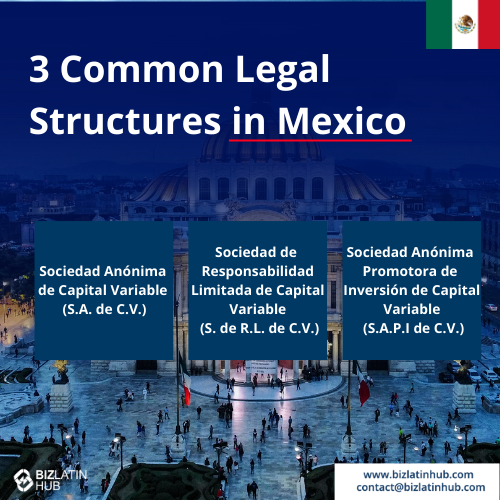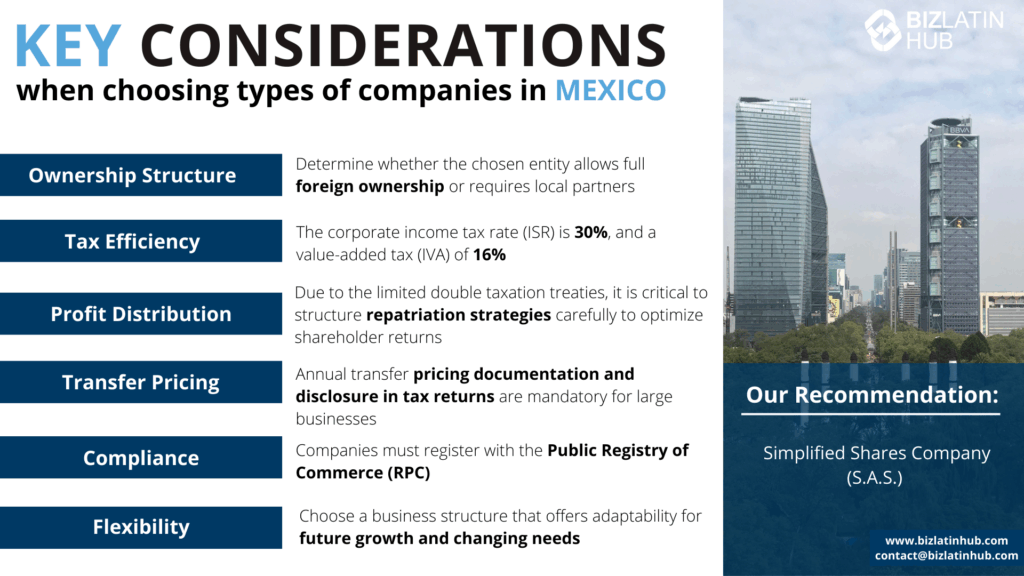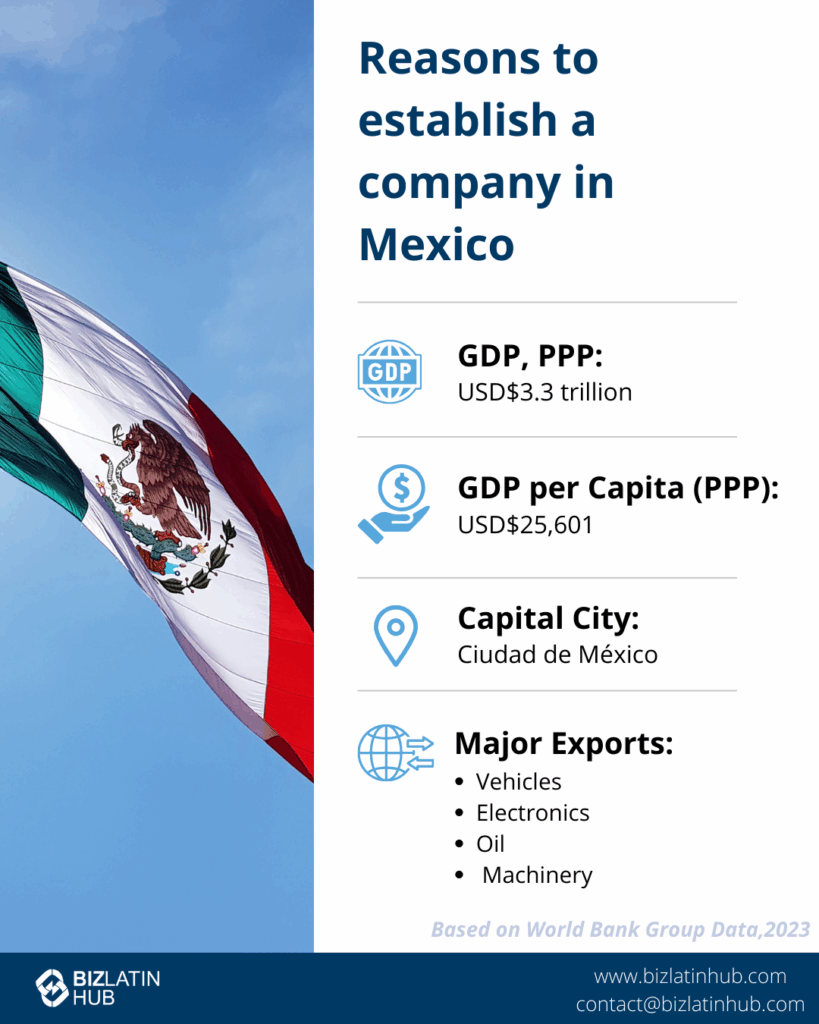When establishing a business in Mexico, selecting the appropriate legal entity is essential for long-term success. Whether you’re a multinational corporation, an entrepreneur, or a small business expanding into Latin America, understanding the available company types — such as S.A. de C.V., S. de R.L., and foreign branches — will help you meet compliance requirements and optimize your operations. This guide covers the main legal structures in Mexico and how to choose the one that aligns with your goals to register a company in Mexico.
Key Takeaways
| What are the common legal entity types in Mexico | S.A. de C.V. – Sociedad Anónima de Capital Variable (Stock Corporation). S de R.L. de C.V.- Sociedad de Responsabilidad Limitada de Capital Variable (Limited Liability Company – LLC). S.A.S.- Sociedad por Acciones Simplificada (Simplified Shares Company). |
| What is the most common Mexican business entity? | Popular with investors from the US is the Sociedad de Responsabilidad Limitada de Capital Variable (S de R.L. de C.V) that has similar benefits to an LLC in the US enabling a smoother access to the Mexican Market. |
| What are the primary considerations when choosing a business entity in Mexico? | Ownership Structure. Tax Efficiency. Profit distribution. Transfer Pricing. Compliance. Flexibility. |
Main Company Types in Mexico
Mexico has various types of legal structures from which you can choose. Here you can see what they are and what benefits each one has. Knowing which of the legal structures in Mexico suits you best will depend on the type of business you operate.
- S.A. de C.V. – Sociedad Anónima de Capital Variable (Stock Corporation).
- S de R.L. de C.V.- Sociedad de Responsabilidad Limitada de Capital Variable (Limited Liability Company – LLC).
- S.A.S.- Sociedad por Acciones Simplificada (Simplified Shares Company).
Comparison Table: Key Legal Entity Types in Mexico
| Entity Type | Best For | Shareholders | Liability | Legal Personality | Tax Status |
|---|---|---|---|---|---|
| S.A. de C.V. | Most common; ideal for local and foreign companies | 2+ | Limited to capital | Yes | Subject to corporate tax |
| S. de R.L. | Partnerships and investor-managed businesses | 2–50 | Limited to contributions | Yes | Subject to corporate tax |
| Branch of a Foreign Company | Multinationals expanding into Mexico | 1 (foreign HQ) | Parent company liable | Yes | Taxed as a Mexican entity |
1. S.A. de C.V. (Sociedad Anónima de Capital Variable)
Who should choose this: Businesses seeking flexibility, access to external investment, and share issuance. It’s the most popular structure for both domestic and foreign investors in Mexico.
The key facts for the stock corporation and most popular legal structure in Mexico are:
- The company is formed and the company value split into shares which are normally protected through the use of creditors.
- Stock Corporations have no limits on the number of shareholders that can invest in the company. This means that raising the necessary capital (MXN$50,000 – approximately USD$2,700) is very achievable for new companies as an unlimited number of people can contribute.
- Although this structure includes certain bureaucratic and administrative burdens, it is undoubtedly the structure that has the largest potential for growth and profit.
2. S. de R.L. (Sociedad de Responsabilidad Limitada)
Who should choose this: Smaller businesses or partnerships where direct involvement in management is expected. Offers liability protection with tighter ownership transfer controls.
The second most popular type of legal structures in Mexico is the Limited Liability Company. It is also based on shares and has the following distinguishing features:
- An LLC is very accessible for SMEs with an initial deposit to form the company of just MXN$3,000 (approximately USD$160).
- Another advantage is that taxes are paid through individual members’ tax return, rather than as a collective company.
- Individuals can enjoy significant protection of their assets, and are only ‘responsible’ for their own shares in the company, as suggested by the name.
Expert Tip: Pass-Through Tax Treatment
From our experience, US corporations establishing subsidiaries in Mexico almost exclusively choose the S. de R.L. structure. This is because, under US tax law (“Check-the-Box” regulations), the S. de R.L. can be treated as a disregarded entity (partnership) rather than a corporation.
This allows the US parent to consolidate the Mexican subsidiary’s losses or profits directly. We advise US investors to consult their tax counsel, as this is the primary strategic reason to choose S. de R.L. over S.A.
3. S.A.S. (Sociedad por Acciones Simplificada)
The third major legal structure in Mexico is the S.A.S., which is mirrored in other Latin America jurisdictions such as Argentina and Colombia. It is a relatively new concept that was announced in 2016 as part of the reforms to the General Law of Commercial Companies.
The advantage of this structure is clear and stems from the very reason that this structure was introduced. Mexico is making significant steps to open up their market for foreign investment, and have made many reforms to different pieces of commercial legislation to simplify and encourage foreign operations. The S.A.S. is a perfect example of this.
Some key characteristics of the Mexican S.A.S. include:
- A relatively cheap, fast and simple formation process and corporate structure, and is ideal for SMEs looking for an easy route-to-market.
- One potential problem involved with this corporate structure is the fact that there is an annual maximum permissible profit of MXN$5,000,000 (approximately USD$265,000). For this reason, the S.A.S. is preferred amongst SMEs as opposed to multinationals looking to expand operations.
Branch of a Foreign Company
Installing a branch in Mexico is an attractive alternative option for companies who have headquarters in a foreign country. In order to install the branch, proof of the existence of the office overseas must be provided to local authorities. It suits already well-established companies looking to build on existing brand awareness.
The branch will have to prove the following conditions:
- A representative in the country where the company is being established.
- Carry out business in line with partnership purposes.
- Have own accounting and submit annually its balance sheet to the controlling authority.

How to Choose the Right Legal Structure in Mexico
Ownership Structure
Assess whether the chosen business entity allows full foreign ownership, as Mexico permits 100% foreign ownership in most industries. However, certain strategic sectors, such as oil and gas exploration, electricity distribution, broadcasting, and domestic transportation, have restrictions requiring local partnerships or government involvement. Understanding these industry-specific regulations will help ensure compliance and smooth operations in Mexico.
Tax Efficiency
Evaluate how Mexico’s tax system impacts your business. The corporate income tax rate (ISR) is 30%, and a value-added tax (IVA) of 16% applies to most goods and services. For businesses exporting goods or services, VAT refunds may be available. Mexico offers tax incentives for companies operating in Free Trade Zones (FTZs), specific industries like manufacturing (through the IMMEX program), and R&D initiatives. Proper tax planning, including reviewing eligibility for these benefits, is crucial for optimizing costs while maintaining compliance.
Profit Distribution
Consider the tax implications of distributing profits. Dividends paid to non-residents are subject to a 10% withholding tax, in addition to corporate taxes already paid at the entity level. Mexico has an extensive network of double taxation treaties with countries like the U.S., Canada, and European nations, which can reduce withholding taxes on dividends. Developing a sound repatriation strategy is essential to maximize shareholder returns and minimize tax burdens.
Transfer Pricing
Comply with Mexico’s transfer pricing regulations, which follow OECD guidelines. Companies engaged in cross-border transactions with related parties must ensure that these transactions reflect arm’s-length pricing. Annual transfer pricing documentation and disclosure in tax returns are mandatory for businesses exceeding specific revenue thresholds. Failing to comply can result in significant penalties and increased scrutiny from tax authorities.
Compliance
Prepare for Mexico’s extensive compliance requirements. Companies must register with the Public Registry of Commerce (RPC) and obtain a Tax ID (RFC) from the tax authority (SAT). Financial reporting must align with Mexican Financial Reporting Standards (NIF) or IFRS for larger entities. Annual tax declarations and monthly VAT and payroll tax filings are mandatory. Labor compliance is critical, including contributions to the Mexican Social Security Institute (IMSS) and adhering to local employment laws. Meeting these obligations ensures legal standing and minimizes risks.
Flexibility
Select a business structure that fits your operational needs and long-term goals. Common business structures in Mexico include:
- Sociedad Anónima (S.A.): A widely used structure for larger companies, allowing the issuance of shares and raising capital through private or public investors. It requires a minimum of two shareholders and provides limited liability.
- Sociedad de Responsabilidad Limitada (S. de R.L.): Ideal for small to medium-sized businesses, offering limited liability and simpler governance. It limits the number of partners to 50, making it suitable for closely-held entities.
- Sociedad por Acciones Simplificada (S.A.S.): A flexible and simplified structure designed for small businesses or sole proprietors. It can be incorporated with just one shareholder and features reduced compliance requirements.
Choosing the right structure is essential for flexibility in adapting to Mexico’s dynamic regulatory and economic environment.
Note: Our recommendation to clients is forming a Simplified Shares Company (S.A.S.) as it offers simplicity and speed in incorporation, with minimal capital requirements and a quick formation process. Additionally, the S.A.S. structure provides flexibility in ownership, making it a suitable option for various business models.

Steps to Incorporate a Company in Mexico
The steps to form a company in Mexico are:
- Step 1 – Decide which Mexican Legal Entity to use.
- Step 2 – Decide on a Company Name.
- Step 3 – Identifying the UBO.
- Step 4 – Drafting the Company’s By-laws.
- Step 5 – Obtaining a Tax Identification Number (RFC- Registro Federal de Contribuyentes).
- Step 6 – Obtaining a Fiscal Address.
- Step 7 – Opening a Corporate Bank Account.
Compliance Tip:
All companies in Mexico must be registered with the Public Registry of Commerce (RPC), obtain a Federal Taxpayer Registry (RFC) number from SAT, and enroll in the Mexican Social Security Institute (IMSS) when hiring staff.
Common Pitfalls When Choosing a Legal Entity in Mexico
- Assuming all company types allow free share transfer (S. de R.L. restricts this)
- Choosing a branch without understanding full parent company liability
- Failing to appoint a resident legal representative
- Misunderstanding tax obligations — especially for foreign-owned entities
- Skipping mandatory notarial formalities or omitting required bylaws
Adapting Your Corporate Structure for Success in Mexico

Of course, this is all about getting started. After a period of success in the Mexican business environment you may find that your needs have changed.
If your company exceeds the profit limit of MXN$5,000,000, you can adjust your legal entity to adopt a new corporate structure.
The ideal structure depends on your business objectives and operational needs in Mexico.
Consulting local experts before incorporating ensures you select the most suitable legal framework.
Two advanced corporate structures, SAPI (Stock Corporation for Investment Promotion) and SOFOM (Multi-Purpose Financial Company), cater to companies aiming to enter the Mexican Stock Exchange (MexBol or BMV).
For further guidance on these structures or other inquiries, contact our team for expert assistance.
Partnering with Biz Latin Hub for Company Formation in Mexico
The time could not be riper to get involved in the emerging, dynamic market growth in Mexico. The wide range of attractive industries and sectors is complemented by a number of different legal structures in Mexico that all provide different advantages for investors with different requirements.
Biz Latin Hub is a leader in providing support and consultancy services for companies in all major Latin jurisdictions. The Biz Latin Hub Mexico team will be the perfect partner for helping you to establish successful operations in Mexico.
Reach out to us now to discuss how we can support you in achieving your business goals.
Or read about our team of expert authors.
FAQs: Legal Entities in Mexico
1. Can a foreigner register a company in Mexico?
Yes, foreign individuals and entities can register a company in Mexico. However, there are certain legal requirements and procedures that need to be followed, including obtaining the appropriate visa or residency status, complying with investment regulations, and registering the company with the Mexican authorities.
2. What type of legal entity is a S.A.S in Mexico?
The S.A.S is a limited liability type of company. Its shareholders contribute capital to the company in exchange for shares.
3. How do I create an S.A de C.V. (Sociedad Anónima de Capital Variable) in Mexico?
To create an S.A.S in Mexico, you’ll need to follow specific steps outlined by the Mexican government. This typically involves drafting articles of incorporation, obtaining a tax identification number, registering with the Public Registry of Commerce, and fulfilling any additional regulatory requirements.
4. What is an LLC (Sociedad de Responsabilidad Limitada de Capital Variable) in Mexico?
An LLC, or Limited Liability Company, in Mexico is known as S de R.L. de C.V. It is a flexible business structure that combines elements of partnerships and corporations. LLCs offer limited liability protection to their members while allowing for simplified management and taxation.
5. What is the business structure of SAS (Sociedad por Acciones Simplificada) in Mexico?
The Simplified Shares Company (S.A.S) is a relatively new legal entity in Mexico designed to streamline the process of starting a business. It offers a combination of speed, flexibility, and investor-friendly features that make it a suitable choice for both domestic and foreign businesses looking to establish a presence in Mexico.
6. What is the most popular legal structure for foreign investors in Mexico?
The S.A. de C.V. is the most widely used due to its flexibility, ability to raise capital, and adaptability to most business models.
7. How long does it take to incorporate a company in Mexico?
Typically 3–5 weeks, depending on notary availability and documentation.
8. Do I need a local partner to form a business in Mexico?
No. You don’t need a local partner, but you do need a legal representative with a tax ID (RFC) and local address.
9. What’s the difference between S.A. de C.V. and S. de R.L.?
S.A. de C.V. offers more flexibility for growth and outside investment, while S. de R.L. is more private, with restrictions on share transfer and ownership.
10. Are branches taxed the same as Mexican companies?
Yes. Branches are treated as permanent establishments and are subject to the same tax rules as Mexican entities.
11. Can I convert my company structure later?
Yes, but it requires a formal legal process through a notary and can be costly. It’s advisable to choose the right structure at the start.






